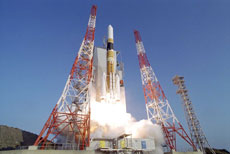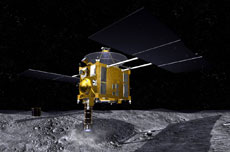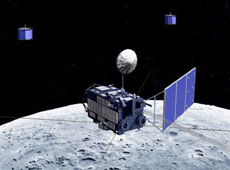Q. What do you think about Japan's space development policy?
Well, JAXA put forward its space vision I guess three years ago now. As I understand it, the debate in the Japanese society about the purposes of the Japanese space program is going on but isn't complete. Japan has some interesting issues before it, having to do with your the basic Diet resolution that created NASDA back in 1969 and said "peaceful purposes only." In most of the world, "peaceful" includes securing the society, and Japan has developed information-gathering satellites as important elements of its own security. And I know that there is a debate in Japan now about broadening the definition of peaceful to include non-aggressive applications of space for national security. In my view, that makes sense, it is a mature approach to what space capabilities can add to the society.
But also in the space vision there is this, I won't call it a tension, but a kind of split. On one hand there is the use of space capabilities to improve the quality of life here on Earth, to provide applications, services, direct benefits to the society. Areas like communications and Internet accessibility and navigation systems. I think that's all very good, and certainly it will happen if it's right in terms of cost-benefit. And then there's the outward-looking space-exploration, space-science part of the program. I think that as a country, with the intelligence and the wealth that the Japanese society has, it should be part of the great adventure of exploring the solar system and the universe. Part of being a human civilization is curiosity, wondering what's over the next hill, a spirit of exploration. And it seems to me that Japan should be part of that activity in the years to come. And the JAXA Vision 2025 certainly includes both types of activity.
Q. JAXA was established in 2003 with the merger of three different space institutions in Japan. What is your impression of this merger?

Japanese H-IIA Launch Vehicle

Japanese Asteroid Explorer Hayabusa

Japanese Moon Explorer SELENE
I think the consolidation of NASDA, NAL and ISAS into JAXA will be in the long run the right move. There were inefficiencies in having three separate organizations. But those were three organizations with pretty strong histories and cultures, and so it's going to be hard to integrate them into a single effective organization. It's probably going to take a decade, and it's now only three years into that decade. So there are still, as I understand it, some tensions and some fights to retain separate identities within the organization.
I think it will take patience, and strong leadership, and recognizing that there are some good things about the separate characters of the original organizations that you want to retain while you integrate. Integration is the right way to go forward, it is the appropriate approach, and it will take time and patience.
Q. How is Japanese space development seen around the world?
I don't think enough people in the world recognize the comprehensive nature of the Japanese space program, from the small scientific satellites that have been developed by ISAS over the years and have done some very interesting science; to the large application satellites that provide essential information for monitoring the Earth, for global climate change; to the fact that Japan has a very sophisticated launch vehicle in the H-IIA, with very advanced propulsion systems. I don't think there's enough visibility of the whole range and level of Japanese space development. I find going around the world that outside the space community, people say "well, does Japan have a space program?" Of course they do. So, I think the world more or less expects Japan to have a good space program but doesn't have much information about what it is.
Q. What advice would you give to JAXA regarding its future activities and goals?
I think it's for the Japanese people, not someone from the United States, to give their advice to JAXA. JAXA serves the interests of the Japanese society. And I know it wants to make the connection between the activities it carries out and the priorities of the Japanese government and the Japanese society. So as an outsider, my advice I guess would be to continue to publicize the benefits of space widely within Japan, so people realize how essential space capabilities are. In Japan everybody has a GPS navigation system in their car. Do people ever stop and think that this is made possible by satellites? Probably not enough. You use your credit card. The credit-card validation goes through a satellite. So do the television programs you get. So space is an integral part of modern life, and I think that JAXA has helped create that capability for the Japanese society, and has put itself in a leading role in space exploration.
The Hayabusa mission to an asteroid was a very exciting mission, with its results still to come. And, soon, the SELENE mission will go to the moon. So Japan is doing very interesting, very exciting things, and I think it's important that the Japanese society recognize the benefits that come from all of that.
| 1 2 3 4 5 |